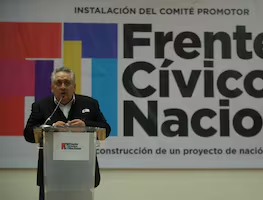Más Información
Brazil's interim government came under fire Monday as a secret recording emerged of the new planning minister discussing a purported pact to push for President Dilma Rousseff's impeachment to stall a huge corruption probe that has engulfed much of the nation's political class.
Even some allies of acting President Michel Temer called for the firing or resignation of Planning Minister Romero Juca, also a senator who is under investigation in the multibillion-dollar kickback scheme at state oil company Petrobras.
Juca, who seems in the recording to be plotting how to remove Rousseff, initially said he would remain in office only to announce a few hours later that he was taking a leave of absence.
Rousseff, Brazil's first female president, was suspended from office by the Senate earlier this month for allegedly using accounting tricks to hide yawning deficits in the federal budget to bolster support for her embattled government. She has repeatedly said she did nothing wrong.
"This shows the true reason behind the coup against our democracy and president Rousseff's mandate," tweeted Ricardo Berzoini, former minister of political relations who lost his post when Rousseff was suspended. "Their objective is to stop the Petrobras probe, to sweep the investigations under the rug."
Temer, who was vice president, took over after distancing himself from Rousseff and whipping up votes in Congress for her suspension. He will remain in power while the Senate conducts a trial.
The day began with a published transcript of a conversation between Juca and Sergio Machado, a former senator who until recently headed another state oil company, Transpetro.
Soon after the transcripts were published by the newspaper Folha de S.Paulo, Juca called a news conference and said his comments had been taken out of context. He said he was not pushing to impeach Rousseff, but rather noting that things would be different under a different government, especially in Brazil's struggling economy.
By the afternoon, the newspaper posted on its website the hour-plus recorded conversation broken up into two parts. Juca never mentions the economy.
The recording is sure to deepen Brazil's political crisis. Rousseff supporters and the president herself have long argued her administration was the victim of a coup orchestrated by opposition lawmakers, in large part to dilute the Petrobras investigation.
Over the last two years, dozens of the country's elite, from lawmakers to top businessmen, have been tried and jailed in a probe so large that it has shocked even Brazilians long inured to graft in politics.
Rousseff's popularity took a hit because of the investigation. Much of the alleged wrongdoing took place while her Workers' Party was in power the last 13 years, though she herself has never been implicated.
Although she was hurt politically by the probe, Rousseff refused to do anything to tamper with an investigation that she said Brazil badly needs.
The leaked recording was of a March meeting at Juca's house, weeks before Brazil's lower Chamber of Deputies voted to send the impeachment measure to the Senate. How the recording was made was not clear.
Juca acknowledged the conversation but said he didn't know it was made, since he and Machado were alone. The newspaper did not disclose how it was obtained.
In the conversation, Juca said he wanted to keep Judge Sergio Moro out of the Petrobras investigations related to him, others in Temer's inner circle and Senate President Renan Calheiros. Moro, the lead judge on the Petrobras probe, has moved against people who don't hold elected offices or Cabinet positions. Only the Supreme Federal Tribunal, the country's highest court, can decide to charge or put on trial federal lawmakers and Cabinet members.
Out of office, Machado was seen as vulnerable, and according to press reports had been negotiating a plea deal.
"We have to solve this. We have to change the government so the bleeding is stopped," Juca said in the recording, according to the newspaper account.
Machado responded: "The easiest solution is to put Michel in." Juca agreed.
Juca said he had talked to unnamed justices in Brazil's top court and heard that the press and other institutions would lower the pressure once Rousseff was out of office.
Juca also said key figures of the opposition to Rousseff, including defeated presidential candidate Aecio Neves and new Foreign Minister Jose Serra, were "all on the tray to be eaten" by the investigations.
At a news conference, Juca said the "bleeding" he to which he referred had to do with Brazil's economy, which is expected to contract nearly 4 percent this year after an equally dismal 2015.
Juca also denied trying to stop the Petrobras probe.
"I always defended those investigations," he said, adding that he was not afraid of being investigated. "I think it is changing Brazil's history."
A few hours his news conference, Juca said he would take a leave of absence.
"I don't want these manipulations to harm this new administration," he told reporters in Brasilia. He said Temer could decide whether to bring him back once he is cleared of wrongdoing.
Some of Temer's allies were quick to say Juca should be fired only 12 days after being sworn in.
"With all this, it is not good that he stays on," said lawmaker Pauderney Avelino, a Temer ally.
The newspaper O Globo, highly critical of Rousseff, posted an editorial urging the interim president to fire Juca.
Temer's Brazilian Democratic Movement Party, the largest in Congress that has no particular ideology, has been involved in numerous scandals.
"This is not a surprise because it's what people expect from an administration led by" this party, said Claudio Couto, a political science professor at Fundacao Getulio Vargas, a Sao Paulo-based think tank and university.










